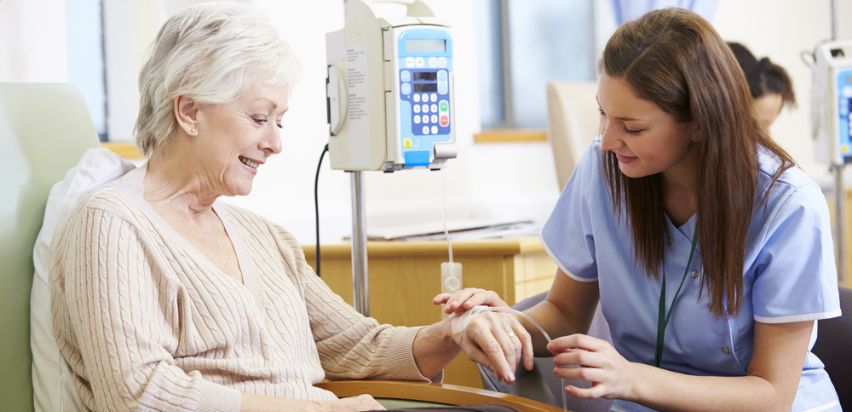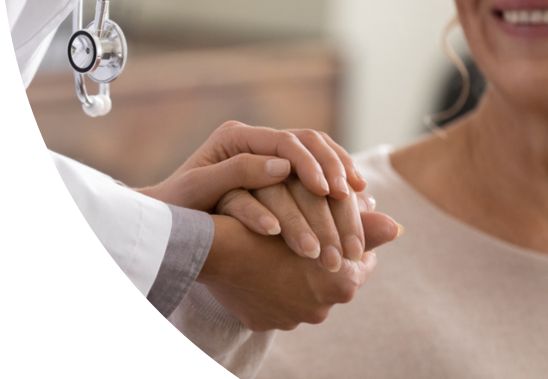Chemotherapy Tips
Coming to terms with a cancer diagnosis and coping with the impact treatments can have on your lifestyle is not easy.
Chemotherapy treatment and the way each patient reacts and responds is unique.

Every patient will experience the side-effects of chemotherapy in different ways. Some may get many side-effects, a few, or none at all. It all depends on the type and amount of drugs you receive and how your body reacts to them. All of these effects are normal so try not to worry.
Your team are with you throughout your journey to offer you personal advice on how to cope and to support you along the way.
Below are some tips on how to cope with the more common side-effects associated with chemotherapy:
During chemotherapy treatment, hair can thin, or fall out in patches, or there may be complete loss. This is also known as alopecia. It is temporary and usually grows back two to three months after chemotherapy is complete. It is a very visible and recognisable sign of dealing with cancer, which often leaves people feeling vulnerable. The emotional effect of hair loss can vary from person to person.
Before hair loss:
- Consider cutting your hair short or shaving your head
- Discuss the fact that you are receiving chemotherapy with your hairdresser. They may be able to offer more gentle hair products
- Use a mild shampoo, such as baby shampoo
- When drying your hair, pat rather than rub with a towel
- If you are considering buying a wig, do so while you still have hair. This way, the colour and style can be matched to your own hair
Avoid using items that hurt your scalp - these include:
- Straighteners or curling irons
- Hair spray, dyes or bleach
- Products to perm or relax your hair
- Rubber bathing or swimming caps
- Hair bands or clips
- Electric hair dryers
- Protect your scalp from sun exposure by wearing hats, scarves or turbans
- Make sure you apply sunscreen to prevent sun damage
- Stay warm - you may feel colder once you lose your hair
- Sleep on satin pillow cases. Satin causes less friction than cotton and may be more comfortable
- Talk about your feelings. Many people feel upset, angry or depressed about hair loss
There are a number of headwear alternatives available to patients who suffer hair loss following chemotherapy treatment. Some people choose to wear a hat, scarf or bandana. Others choose to get a wig or hairpiece. If you decide to get a wig, it is better to organise it before your hair falls out. That way you will get a better match to your own hair colour and style.
Tip: If you are considering buying a wig, and you have a medical card, check the HSE Website at www.hse.ie to see if you are entitled to a subsidy. If you have private health insurance, check with your insurer too. You will require a referral letter from the cancer centre team when applying, which we will be happy to arrange.
Some chemotherapy drugs can irritate the area of the brain controlling nausea, or irritate the cells that line the digestive tract i.e. mouth, throat, stomach and intestines. This can cause the side effects of nausea and vomiting during treatment.
Nausea can also be caused by a patient feeling anxious and stressed in anticipation of their next chemotherapy treatment.
It is important to control nausea and vomiting so that you are able to drink and eat adequately. You will be given medicines to help control the nausea. These medicines can work differently for every patient. If they are not working for you, please let your doctor or nurse know.
How can I control nausea and vomiting?
- Take the medicines as directed
- Eat small meals frequently
- Drink fluids without caffeine, or soft drinks that have lost their fizz
- Drink slowly, using a straw
- Avoid foods that are rich, spicy or greasy – and if possible, have someone else do the cooking
- Sit upright and eat slowly
- Eat crackers or similar dry foods, especially in the morning.
- Keep your mouth fresh and clean
- Suck on ice chips or lollies
Other techniques that can also help include:
- Deep breathing
- Relaxation
- Damp cold cloth on your forehead
- Distraction/ fresh air
- Alternative therapies such as acupuncture
If you are finding it difficult to eat or to keep food down, referral to a Dietitian is possible.
Call your doctor or nurse if:
- You are vomiting over a 24hr period
- If your anti-nausea medicines are not working
White blood cells (WBC) help to fight bacterial and fungal infections. Chemotherapy decreases your white blood cell (WBC) count. If this happens, you must take the necessary precautions to prevent infection until your WBC count returns to normal.
You should be aware of the signs of infection. Be sure to discuss these with your doctor or nurse, and learn how to take your temperature orally with a digital thermometer.
Signs of infection
Notify your Doctor or Nurse if you develop any of the following signs of infection:
- Fever: temperature of 100.4°F ( 38°C) or higher
- Shaking chills/ low temperature below 35°C
- Unrelieved nausea and vomiting
- Flushed face
- Sweats
- Cough
- Neck stiffness
- Earache
- Diarrhoea
- Mouth sores
- Headache
- New onset of pain
- Irritability
- Pain or burning during urination. Cloudy urine
- A general feeling of tiredness; especially if accompanied by flu-like symptoms
Do not take drugs such as aspirin, paracetamol or products containing ibuprofen, unless otherwise directed by your doctor.
General hygiene
- Shower or bathe daily. Wash carefully under your arms, in skin folds, and in the rectal and genital areas
- Use soap to kill germs - look for soaps that are labelled as “antimicrobial”
- Wash hands regularly, especially before cooking and eating, and after you use the bathroom.
- Perform your mouth care routine after each meal and before going to bed; use an ultra-soft toothbrush and rinse with a recommended mouthwash
- Use antibacterial hand gels if possible, particularly after shaking hands and after direct contact with young children
Preventing infection
- Avoid having visitors to your home who have colds or recent infections
- Postpone any dental work or any invasive procedure that does not need to be done immediately, having first spoken with your doctor
- Stay away from children who have had a “live virus” vaccine or chickenpox
- Ask your doctor or nurse if you can use tampons, suppositories or enemas
- Do not eat raw meats, raw fish or raw eggs
- Wash and peel raw vegetables and fruit well before eating them
- Do not share eating or drinking utensils
- Do not have a manicure, pedicure, waxing or tattoo without the approval of your Doctor or Nurse
- Do not shave your scalp or any other part of the body
- If shaving, use caution when shaving your face - if possible, use an electric razor
- Do not touch animal excrement (e.g. litter boxes, bird cages)
- Do not garden or handle soil compost
- Have a supportive network of family and friends available to help out if needed
- When attending for treatment you can bring a friend or family member with you if you wish
- Remember to stay hydrated before and after your treatment
- Bring your books/newspapers, knitting and crochet, sketching tools or laptop with you when having your treatment, or you might just want to rest and relax - the choice is yours
- Bring lip balm/moisturiser, as the air can be drying
- Wear loose fitting clothes for comfort
The cancer centre team is always available to answer any questions you may have.










.jpg?sfvrsn=1e88c7a4_1)
.jpg?sfvrsn=f9d93a56_1)
.jpg?sfvrsn=ac8a10d7_1)
